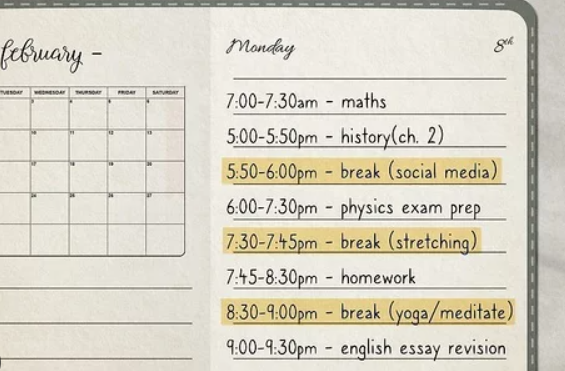Taking into account our personal experiences and insights gathered from fellow students, we’re presenting 8 practical tips to aid your focus on studies. These tips may not be revolutionary or entirely novel, yet they have proven efficacy.
How to be focused on studies

To maintain focus during studies, create a quiet, organized study space with minimal distractions. Break down tasks into manageable chunks, set clear goals, and use time management techniques like the Pomodoro Method. Stay organized, practice mindfulness, and ensure you’re well-nourished and hydrated. Incorporate physical activity into your routine and use technology wisely. Take regular breaks to prevent mental fatigue, and consider studying with friends to share ideas and stay motivated.
1. Create a place just for studying
Having a dedicated desk or study area is really important for doing well in your studies. It’s a tip that many people share because it really does help you stay focused.
When you have a desk or a special area just for studying, it gives you a place to concentrate. It’s like having a spot that tells your brain, “Okay, it’s time to work now.”
You can set up your desk however you like and decorate it to make it comfortable for you. The most important thing is that it’s a space reserved just for studying.
When you’re at your desk, it’s a signal to your brain that it’s time to study. As you keep using your desk for studying, your brain gets used to it, and it becomes easier to focus.
People who work from home or freelance often say the same thing. Having a dedicated workspace helps them get into the right mindset for work.
2. Establish a regular schedule for studying
Have you ever noticed how athletes get ready for a big event? They have a specific way of getting prepared.
They stretch in a certain order, put on their socks at a particular time, maybe say a quick prayer, or talk to themselves with their eyes shut. It might seem superstitious, but it’s about using the power of having a routine.
Having a set routine helps get your mind and body ready for what’s ahead. After doing it for a while, it becomes automatic.
Following these steps will naturally put you in the right mindset to study, even on days when you’re feeling distracted.
Just like in sports, everyone’s routine is different. You can create your own routine to tap into the same psychological strength.
Whether you start by tidying up your study area, closing the blinds, playing some music, or doing something else, having a routine is a powerful tool that you can use to your advantage.
3. Make a plan for when you’ll study
Managing your time well is super important for students and later in your job. If you can’t meet deadlines, it’s tough to succeed, no matter how well you do in school.
Different students have different ways of planning their study time. Some like using a color-coded chart to organize their subjects and study sessions. Others prefer using a calendar app or a chalkboard.
There’s no one-size-fits-all method for creating a study schedule. It’s all about finding what works best for you.
If you find you study better in the morning, try to focus your study sessions then. Write down your schedule where you can see it, get your study area ready the night before, establish your routine, and stick to it.
If you like using an app and are okay studying at any time of day, go for it.
If planning backward from your exams to the present helps you, use that to make sure you have enough time to study for each exam.
Just remember to also schedule some downtime to relax and enjoy being a student between study sessions.
4. Tell yourself what you want to achieve, what treats you’ll give yourself, and when you plan to do it
Next, it’s important to tell your friends and family about the goals you’ve set, the rewards you’re giving yourself, and your study schedule. This might seem like a small thing, but it’s actually a really helpful trick for your mind.
When you keep your goals and schedule to yourself, you’re only accountable to yourself. And we’re pretty good at finding excuses for ourselves and letting ourselves off the hook when we don’t reach our goals.
But when you share your goals and schedule with others, they know what you’re aiming for. So, if you don’t succeed, you’re not just letting yourself down, but you’re also letting them down. And nobody wants to disappoint others!
This is a simple but powerful way to stay focused on your studies, and surprisingly, not many people use it.
5. Get rid of things that take away your attention
Distractions are everywhere, from noisy neighbors to hunger pangs and social media notifications. To stay focused on studying, it’s essential to minimize distractions as much as possible.
Some may find it helpful to lock the door, hang a “do not disturb” sign, put on headphones, and dive into their books. Others might prefer turning off their phones, lighting a candle, closing the curtains, and using a reading light.
The key is to identify and eliminate whatever distracts you personally. While everyone is different, we highly recommend turning off your phone or setting it to silent mode to avoid interruptions.
6. Getting enough sleep helps you to learn better

Just like taking breaks helps your brain process the information you’ve learned, sleep does that even more effectively.
Sleep is really important. We can’t stress enough how crucial it is to get good sleep.
The key thing is to focus on quality, not just the number of hours.
Sleeping for 15 hours a day isn’t healthy for anyone. But aiming for 7-8 hours of uninterrupted sleep is ideal.
When you wake up after a good night’s sleep, you’ll feel refreshed, and your brain will have had time to absorb what you learned the day before, making you ready to learn more.
Here are some simple tips for getting quality sleep:
– Try to limit screen time before bed.
– If your room is noisy, consider using earplugs.
– Do some light exercise before bedtime.
– Avoid drinking coffee for at least five hours before going to sleep.
– Don’t eat too much right before bedtime.
Following these tips can help you get the good sleep your brain needs.
7. Nourish your brain
Many students, even those studying medicine or nutrition, don’t eat well. But it’s crucial to stress the importance of a good diet. Nowadays, there are so many options available, like meal boxes, Joe Wicks videos, and food deliveries.
Food is like fuel for your body. If you put bad fuel in, you’ll get bad results out. It’s a simple idea but really explains the importance of eating healthy better than anything else.
The more fresh fruits and vegetables you eat, and the more water you drink, the better you’ll feel.
8. Study together with your friends
Our last suggestion for improving focus while studying involves sharing the experience. Studying often feels like a solitary task—being alone in your room, buried in books with the door shut.
But it doesn’t always have to be that isolating.
Joining study groups, book clubs, or attending cram sessions organized by your university can be beneficial. Another option is teaming up with a few friends who are taking the same course. Studying together can be surprisingly effective.
When you study with others, you can exchange ideas, assist each other with difficult concepts, and motivate one another to reach your academic objectives.




